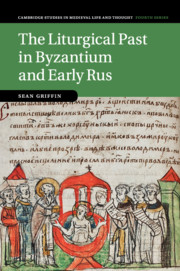Book contents
- The Liturgical Past in Byzantium and Early Rus
- Cambridge Studies in Medieval Life and Thought Fourth Series
- The Liturgical Past in Byzantium and Early Rus
- Copyright page
- Contents
- Acknowledgements
- Abbreviations
- Introduction
- Chapter 1 Liturgy and History in Early Rus
- Chapter 2 The Rus Primary Chronicle
- Chapter 3 Vespers at the Kiev Monastery of the Caves
- Chapter 4 The Dayspring Before the Sun:
- Chapter 5 A New Constantine in the North:
- Chapter 6 A RATIONAL SACRIFICE:
- Conclusion:
- Bibliography
- Index
Chapter 2 - The Rus Primary Chronicle
Published online by Cambridge University Press: 09 August 2019
- The Liturgical Past in Byzantium and Early Rus
- Cambridge Studies in Medieval Life and Thought Fourth Series
- The Liturgical Past in Byzantium and Early Rus
- Copyright page
- Contents
- Acknowledgements
- Abbreviations
- Introduction
- Chapter 1 Liturgy and History in Early Rus
- Chapter 2 The Rus Primary Chronicle
- Chapter 3 Vespers at the Kiev Monastery of the Caves
- Chapter 4 The Dayspring Before the Sun:
- Chapter 5 A New Constantine in the North:
- Chapter 6 A RATIONAL SACRIFICE:
- Conclusion:
- Bibliography
- Index
Summary
The purpose of Chapter 2 is to make my philological discoveries accessible to a non-specialist audience. The chapter begins with the textual history of the Rus Primary Chronicle. It outlines the annalistic format and historical contents of this notoriously difficult text, whilst also providing details about the extant manuscripts and the nature of their compilation. Next, the chapter offers the first ever anglophone history of chronicle studies in Russia and the West. It does so by focusing on the careers of two main figures: the eighteenth-century apostle of German philology in Russia, August Ludwig von Schlözer, and the great early twentieth-century giant of Russian chronicle studies, Aleksei Shakhmatov. It is a strategy which requires my review of the remaining literature to be selective in the extreme. Yet this too has its benefits, since my aim is to solve but a single problem. Why were two extraordinarily gifted philologists, and generations of their successors, never able to identify the liturgical sources of the Rus Primary Chronicle? I ultimately conclude that the traditions of modern philology trained these thinkers to analyse the historiographical past, but in so doing it blinded them to the existence of the liturgical past.
Keywords
- Type
- Chapter
- Information
- The Liturgical Past in Byzantium and Early Rus , pp. 35 - 61Publisher: Cambridge University PressPrint publication year: 2019

